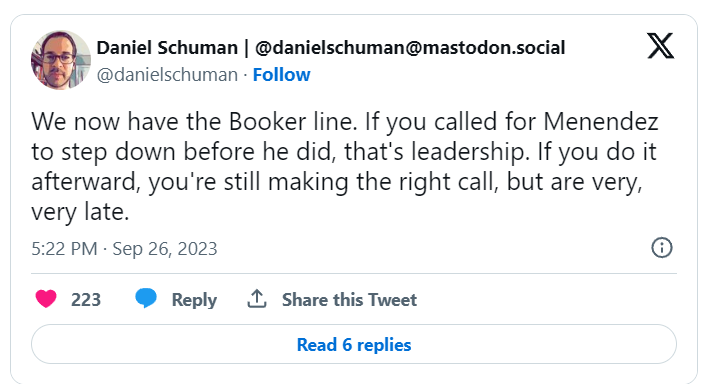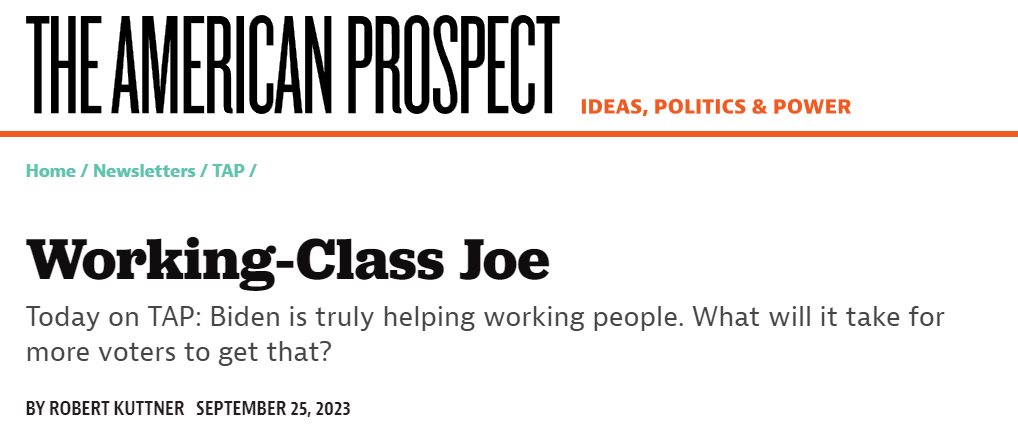Celerity
Celerity's JournalGoogle's Fight Against Antitrust Hits a Roadblock

https://prospect.org/power/2023-09-26-googles-fight-against-antitrust-hits-roadblock/

For decades, Google has dominated the internet search business nearly unchallenged while deploying anti-competitive and arguably illegal practices to maintain its stronghold. So it was no surprise that when President Biden appointed antitrust enforcers to put an end to it, Google immediately began a campaign to do everything possible to protect its monopoly, starting with discrediting the enforcers. Leading the charge against Google was Jonathan Kanter, the assistant attorney general for the Department of Justice’s Antitrust Division. In response, Google attempted to disqualify him from investigating and suing the tech giant. But recently, those efforts were dismissed outright in U.S. District Court. Kanter’s confirmation as assistant attorney general for the Department of Justice’s Antitrust Division was a significant step forward for antitrust enforcement. Kanter spent most of his career in plaintiff-side private practice focused on encouraging antitrust enforcement. This doesn’t please Big Tech, which argues that Kanter should be recused from antitrust enforcement because his pre-government work focused on holding monopolies like Google accountable.
While it is clear why DOJ officials must recuse themselves from cases in which their former client is a defendant, it makes no sense to force an official to recuse himself based on work advocating for stringent enforcement of the law. If we want committed civil rights and environmental advocates to run the Justice Department’s divisions tasked with enforcing those areas of the law, shouldn’t we also want someone committed to antitrust enforcement to run the Antitrust Division? Would an attorney who represented one set of plaintiffs against pollution against Exxon be barred from regulating Exxon as head of the DOJ’s Environment and Natural Resources Division? As Harvard Law professor Laurence Tribe explained: “The only substantial effect of Kanter’s recusal now would be to deny the DOJ access to his insights and years of expertise in prosecuting this case. It’s not hard to see why a company might want that.” It goes without saying that if a former Google official were in Kanter’s position now, the company would have no objections about his or her impartiality.

Indeed, at the same time that Google was seeking to disqualify Kanter, the company had no problem taking advantage of the expertise of a slew of former government officials. In fact, Google has at least a dozen former high-ranking DOJ officials on retainer, spread out across multiple elite law firms. That’s in addition to at least five members of its in-house legal team who previously worked at the DOJ. (This includes individuals like Jack Mellyn, who joined Google in November 2022 and previously served as the DOJ’s attorney adviser for competition policy and advocacy, and Kevin Yingling, who has been with Google since 2009 and previously was a trial attorney at the DOJ.) In one notable example, Google hired John Carlin, the former right-hand man of Deputy Attorney General Lisa Monaco, who herself is a former lawyer for Apple. Carlin is now a partner at the mega-law firm Paul Weiss, which previously employed Kanter as he represented Google competitors. By hiring the firm, Google effectively paid it to switch sides.
So on the one hand, Google argues that the government cannot benefit from experienced antitrust litigators who have a sincere belief in antitrust litigation, but it also obviously believes it should be able to hire as many turncoat former DOJ officials, ready to fight on behalf of whoever is paying them, as it wants. If there is any ethical concern here, it is precisely this revolving-door behavior. In recent years, several former Big Tech lawyers have revolved in and out of the DOJ, only to return to representing their tech clients. Cushy corporate jobs worth far more than the stacks of cash and gold bricks recently found in the home of Sen. Bob Menendez (D-NJ) are widely available to top government officials willing to leverage their important government knowledge and relationships on behalf of corporate clients. Examples abound of current DOJ officials who have worked for Google and other Big Tech companies, in addition to the ones noted above. The current head of the DOJ’s Civil Division, Brian Boynton, previously served at the department in the Obama administration. In between his stints in government service, he returned to his old law firm, WilmerHale, where his clients included Google. That’s the very definition of the revolving door.
snip
Strikers have twice had guns pulled on them by non-union truckers

https://prospect.org/labor/2023-09-26-uaw-workers-california-stand-up-strike-expands/

ONTARIO, CALIFORNIA – The yellow-and-white big-rig truck approached slowly, maneuvering to turn into the Mopar Los Angeles Parts Distribution Center, owned by Stellantis. A half dozen striking members with UAW Local 230 formed a wall along the driveway, refusing to allow the truck entry. Trucks come to this Mopar site to engage in “cross-docking,” where they exchange parts that then go out to dealerships. Unionized Teamster drivers have refused to cross the picket lines; some have even joined UAW workers as they strike. So the trucking companies have been hiring non-union replacements to try to get parts moving. “We call them scabs,” said Mike Lacey, the strike captain on this past Sunday morning.
On two occasions during the first two days of the strike at this site, one of 38 parts facilities where workers walked out last Friday in an escalation of the UAW’s Stand Up Strike, a scene like this one became more dangerous when the truck driver pulled a gun on the strikers. In the incident that occurred when I was there, the UAW members seemed rather unfazed by this, holding their ground. After a short standoff, the truck reversed and pulled up the road toward another entrance. The workers told me they had locked that entrance with a new lock. But just to be sure, a few members piled into a van and took off toward that entrance.
https://twitter.com/mel_buer/status/1705626598005989886
The workers here take four-hour shifts four days a week, and get $500 a week in strike pay. Most of the ones I spoke with have been working here for 25 years or more. “We’re doing this for the next generation,” said Cheryl Sprinkle, a front-office worker with 29 years at the facility, who has enough seniority to retire in October. Her husband, who was also at the picket lines, retired in 2009 from the plant, and was involved in the last strike here, an independent walkout in 1991 that lasted three months and cost the couple a house they had just moved into. Cheryl moved back with her kids to the family’s house in Wisconsin until the strike settled.
Sprinkle and others explained the pay scale at the facility, which picks and distributes parts to dealers across Southern California. The starting salary for new hires is $15.76 an hour, the workers told me, and while it accrues with experience, there’s a cap at $25 an hour, which can only be reached after eight years. That’s what comes with being stranded on the second tier of lower-wage workers, which has affected all new hires since 2009, when the union agreed to a deal saving the auto companies from bankruptcy. But the more senior workers on the top tier haven’t been benefiting much either. Lacey, who has 25 years with the company, said that workers at Mopar Los Angeles have seen a cumulative raise of just 6 percent over the past 16 years.
snip
Google Erects Cone of Silence Around Antitrust Case

https://prospect.org/justice/2023-09-26-google-erects-cone-of-silence-around-antitrust-case/

The U.S. v. Google antitrust trial is the first major antitrust case of the century taking place amidst a resurgent anti-monopoly movement. Yet it is turning more into a meta news event about the historic lack of public access to the legal proceedings. Public interest in the case has effectively been neutered as Google continues to block open witness testimony and document exhibitions. The main lesson Google appears to have learned from the Microsoft antitrust case from the 1990s is that media scrutiny and bad headlines can sink a corporate defendant’s reputation, if not its case. “Working the refs” is probably the best way to sum up Google’s novel legal strategy in court, and so far it seems to be succeeding with federal district court Judge Amit Mehta.
The legal team has developed a coordinated effort to deny as much evidence as possible from entering into the public record. Google has opted to dissuade the judge from allowing what it calls confidential business information out into the public, which the firm’s attorneys argue will only generate “clickbait.” During the first week, Google’s lawyers unveiled its full-court-press obstruction strategy. The defendants raised “hearsay” objections throughout almost every witness examination run by the Justice Department, especially during that of the star opening witness, former Google chief economist Hal Varian. Documents that Google objected to disclosing included Varian’s own emails with reporters and an unedited transcript of an interview conducted with news publication CNET. At one point, Google’s interruptions became so incessant that even Judge Mehta grew tired with the tactics and pushed back. But he’s largely complied with the defendant’s demands.
Google’s pressure campaign continued into the second week, which resulted in over half of the week’s trial taking place in closed proceedings, per an analysis from Matt Stoller. Tuesday morning also began in closed session. By flooding the zone with objections, the company managed to put enough pressure on Judge Mehta to withhold from the public substantial amounts of documents and key witness examinations, including most of the testimony of Apple senior executive John Giannandrea and portions of testimony from Google’s VP of finance Mike Roszak. These witnesses were interrogated to build the government’s case that Google uses its monopoly over search engine functions to distort advertising markets. It also pays billions of dollars to be the default search engine on Apple and Android devices, which it then weaponizes through revenue-sharing agreements with partners to beat back rival search engines. Even the amount of money Google paid to Apple for default status has been kept secret, even though both are publicly traded companies and the figure represents revenue for Apple and an expense for Google.

When witness examinations take place in a closed trial, the news is only announced that day, and the court can come back into session at any time. During closed-door sessions, members of the press resort to waiting around just outside the courtroom, hoping to catch one of the lawyers to get a comment when they leave. These extensive closed-door sessions also dissuade reporters from showing up at all, unless the trial is their sole dedicated beat. Out in the hallway, one of the attorneys representing the delegation of state attorneys general who have joined the DOJ in the lawsuit mentioned that the truncated public accessibility in the trial was “totally unprecedented.” Jason Kint, a representative for a consortium of news publishers called Digital Content Next, has been attending the trial since the first week. He remarked that “Google’s fight to keep evidence sealed from the public helps soften press coverage and embarrassment for the company.” Furthermore, he noted that it’s a tactic to withhold information from regulators and elected officials in the U.S. and overseas, policymakers who could initiate further investigations or use the evidence to crack down on the company.
snip
How Big Tech Is Undermining Childhood

https://prospect.org/culture/books/2023-09-26-how-big-tech-is-undermining-childhood/
an edited transcript
Robert Kuttner: Susan Linn is a psychologist, a child advocate, and a ventriloquist who worked with Fred Rogers. She virtually invented puppet therapy, working with cancer patients at Children’s Hospital using puppets. She is a lecturer at Harvard Medical School. Susan is also the founder of the Campaign for a Commercial-Free Childhood, which is now called Fairplay. She is the author of three important books: Consuming Kids, The Case for Make Believe, and most recently, Who’s Raising the Kids: Big Tech, Big Business, and the Lives of Children. Susan has written for several magazines, including the Prospect. Among her achievements as a child advocate, she convinced Disney to stop marketing Baby Einstein on the premise that it had any educational value. And the Campaign for a Commercial-Free Childhood worked with the FTC to prevent Google from monetizing information on kids that Google had gotten through YouTube Kids. Susan has been my friend for more than 40 years. Susan, let me start by asking you, your book Consuming Kids was published almost two decades ago. What has worsened in the last two decades that persuaded you that there needed to be another book on this?
Susan Linn: The technology. You know, the technology didn’t get worse. It got better, it got more powerful. It made marketing to children more confusing, more omnipresent, more invasive than it ever was before. In 2004, the major concern was television. And that was powerful enough. But the new technologies are just so much more powerful.
Kuttner: What are some examples of that? Is the problem the medium? Or is it the message, or is it both?
Linn: It’s both. We have to remember that marketing doesn’t just sell products. It sells values as well. People don’t think enough about how the values of commercialism, the values of consumer capitalism, are really antithetical to democratic values. So we’re immersing kids in this culture, that tells them that “me first” is more important than cooperation; a culture that encourages them to think by impulse, to consume, consume, consume. Given the crisis of global warming, it is basically encouraging kids to adopt values that will ultimately destroy themselves and the planet.
snip
Menendez Loses the Senate

https://prospect.org/blogs-and-newsletters/tap/2023-09-26-menendez-loses-the-senate/

The dam officially burst for Robert Menendez’s chances of political survival at around 11:16 a.m. Eastern time on Tuesday, when his New Jersey Senate colleague Cory Booker posted on X: “The details of the allegations against Senator Menendez are of such a nature that the faith and trust of New Jerseyans as well as those he must work with in order to be effective have been shaken to the core … I believe stepping down is best for those Senator Menendez has spent his life serving.”
https://twitter.com/SenBooker/status/1706689173392851098
Until this point, Booker was practically the only holdout among New Jersey Democratic elected officials on the question of whether Menendez should resign. The indictment on operatic allegations of hundreds of thousands of dollars in gifts and bribes (including with gold bars) from an Egyptian businessman and his associates in exchange for various official actions is so over the top that even New Jersey’s less-than-scrupulous Democratic machine bosses have mostly ditched him. Booker himself actually testified as a character witness in Menendez’s first public corruption case, which ended in a mistrial. “It’s almost an understatement to say he was just a partner,” Booker said in that trial, describing Menendez as a mentor and calling him “honest and trustworthy.”
In short, if Menendez has lost Booker, he doesn’t have very many friends left in Democratic politics. Yet, against all odds, he still may survive this onslaught of pressure, especially if Democrats split the field against him in next June’s Senate primary. If Menendez digs in and gets multiple challengers, he could take enough of a sliver of the vote to prevail. As of now, only one challenger, Rep. Andy Kim of South Jersey, has jumped into the race. But many more are circling.Booker is one of 18 Senate Democrats to ask for Menendez’s resignation, which would make the primary calculations a whole lot easier. Sen. John Fetterman (D-PA) was way out in front over the weekend, and on Monday Sens. Sherrod Brown (D-OH) and Peter Welch (D-VT) followed suit. But Tuesday was the real day of reckoning.
It started with Democratic incumbents in potentially tough re-election races next year: Jon Tester (D-MT), Jacky Rosen (D-NV), Tammy Baldwin (D-WI), Bob Casey (D-PA). It escalated with Elizabeth Warren (D-MA) and Martin Heinrich (D-NM). Numerous House members had joined the chorus, including most of the New Jersey delegation and former Speaker Nancy Pelosi (D-CA). Then Booker made it safe for everyone else. As Demand Progress policy director Daniel Schuman noted, there’s now a “Booker line” among Senate Democrats: Anyone who called for Menendez’s resignation before Booker showed real leadership, and anyone afterward is piling on late. After Booker, Mark Kelly (D-AZ), Michael Bennet (D-CO), Amy Klobuchar (D-MN), Kirsten Gillibrand (D-NY), Mazie Hirono (D-HI), Ed Markey (D-MA), Raphael Warnock (D-GA), and Maggie Hassan (D-NH) were among those latecomers.
https://twitter.com/danielschuman/status/1706690686215455087
snip



New Railcar Designed to Transport Spent Nuclear Fuel Completes Final Testing

https://www.energy.gov/ne/articles/new-railcar-designed-transport-spent-nuclear-fuel-completes-final-testing
The U.S. Department of Energy (DOE) recently completed a 1,600-mile round-trip journey from Colorado to Idaho to wrap up final testing on the Atlas railcar. The new specialized railcar will be used to safely and securely transport the nation’s commercial spent nuclear fuel and high-level radioactive waste. Atlas could be cleared for operational use before the end of the year.
Getting “On Track”
Atlas is a 12-axle railcar designed specifically to transport large containers of spent nuclear fuel and high-level radioactive waste and meets the highest safety standards set by the Association of American Railroads (AAR). The final test simulated a full-scale shipment of spent nuclear fuel, carrying steel test weights instead of radioactive cargo.
The railcar was loaded to its maximum weight with a 480,000-pound test load designed to simulate the heaviest transport container certified by the U.S. Nuclear Regulatory Commission. The train departed from Pueblo, Colorado, on September 5 and completed a successful four-day round-trip journey to Scoville, Idaho, collecting valuable data along the way. Atlas was accompanied by a rail escort vehicle (REV), two buffer railcars, and two Union Pacific Railroad locomotives. The entire trip logged more than 1,680 total miles.
“This milestone underscores the Department’s dedication to advancing the safe and secure transportation of radioactive materials, including spent nuclear fuel,” said Dr. Patrick R. Schwab, DOE’s Atlas railcar project manager. “Through the successful completion of the test and the Atlas railcar project, we have delivered a capability for the Department to effectively transport spent nuclear fuel to future DOE storage and disposal facilities, filling a key role for successful operation of a nuclear waste management system.”
Next Stop: Consent-Based Siting..............

snip
Biden is truly helping working people. What will it take for more voters to get that?

https://prospect.org/blogs-and-newsletters/tap/2023-09-25-working-class-joe/

Tomorrow, Joe Biden will join striking UAW workers on a picket line, the first president ever to do so. I’m told the decision was controversial among Biden advisers—isn’t the president supposed to be a neutral broker?—but it was the right decision. The auto companies, like most of corporate America, are awash in profits, while workers are losing jobs, wages, and economic security. Biden’s entire program aims at righting that imbalance. So why not display that class solidarity in the most vivid fashion possible?
It’s also smart and overdue politics. There are more workers than bosses. Biden is underwater in most polls, especially on the economy. This, despite the fact that inflation has been tamed, the economy is at full employment, and wages on average are up slightly. But for most voters, the basics haven’t changed for the better. The exception to that, however, is unionized workers.
Biden’s several public-investment laws serve as a full-employment act for the building trades, extending into much of the next decade. In Biden’s TV ads, how about a real-life construction worker, and a real-life autoworker, telling what Biden has done for them and why they support him. How about a stressed parent telling how much difference the Child Tax Credit made in their lives, and why a vote for Biden and a Democratic Congress is a vote to restore and extend it.
“Our House, Senate, and state legislative candidates are significantly outperforming Biden and make every branch competitive in 2024,” pollster Stan Greenberg told me. “The polling in the battleground states shows him running significantly better than 2020. Critically, he can run stronger if he stops talking about their accomplishments and makes the election a future choice with the Republicans, on the very same issues he has been speaking about.”
snip
Hungary raises fresh objections to Sweden's Nato bid as Turkey casts new doubt on Sweden-Nato deal
I warned all here this would perhaps (even likely) happen
fascist ratfuckers ![]()

https://www.ft.com/content/ebb5522a-17a6-4e14-83ac-b913ad81214d
Hungary has joined Turkey in adding more hurdles to Sweden’s Nato bid, with Budapest expected to extract further concessions from its western allies before ratifying the expansion of the military alliance. Pro-government media in Hungary last week unearthed a 2019 Swedish educational video that described Hungary as a country where democracy was eroding. On Sunday, parliament speaker László Kövér, a close ally of prime minister Viktor Orbán, said that Hungary and Sweden did not see eye to eye on issues of patriotism and therefore did not belong in the same alliance.
“Nato is a defence alliance, and we do guarantee collective defence,” Kövér told a pro-Orbán TV show. “But I don’t think we need an ally that?.?.?. spits on us.” Foreign minister Peter Szijjártó has also used the video as a pretext to remind Stockholm not to take Budapest’s vote for granted, writing to his Swedish counterpart last week not to be “surprised” by the Hungarian parliament’s reaction.
Orbán had agreed to ratify Sweden’s bid, after Turkey lifted its objections in July. But in recent weeks, Turkish president Recep Tayyip Erdoğan has signalled reluctance to take that step as a result of a series of Koran burnings in the Scandinavian country, including in front of the Turkish embassy. The Hungarian government has admitted co-ordinating positions with Ankara on the issue. In the past, Orbán has used his veto on Nato enlargement and other issues within the EU to extract concessions from his western allies.
The Turkish-Hungarian veto meant that Sweden was decoupled from Finland after they jointly applied for Nato membership in May 2022, following Russia’s full-scale invasion of Ukraine. Finland joined the alliance in April this year. The Hungarian warning has been met with astonishment in Sweden and has added to the sense of a Nato application that is still far from certain. Kalle Sandhammar, head of Sweden’s small public broadcaster UR that published the educational video said that it was “in itself gratifying to hear that Hungarian politicians are watching UR”. But he added: “It is deeply ignorant to think that Swedish politicians have control over UR’s content.”
snip
No changes to Turkey deal on Nato, Sweden says
https://euobserver.com/nordics/157442
Sweden is not going to change its deal with Turkey on Nato ratification, which Finland and Nato still expect in October, despite Turkey's new rhetoric. Turkish president Recep Tayyip Erdoğan agreed a seven-point deal with the Swedish prime minister at a Nato summit in Vilnius on 10 July. He also promised to call a ratification vote when the Turkish parliament reconvened in October.
He is now creating fresh uncertainty, by saying the US should first sell him F-16 warplanes and that Sweden stops Kurdish "terrorists" from holding anti-Turkish rallies. "My parliament doesn't view this issue positively, they aren't ready to ratify Sweden's accession protocol," Erdoğan reportedly told press in the wings of the UN General Assembly (UNGA) in New York on Monday (18 September).
But for its part, Sweden says the Vilnius deal is not up for debate. "The agreement is still valid and there will be no new elements added," Anna Erhardt, the Swedish foreign minister's spokeswoman, told EUobserver on Tuesday. And there were no more gatherings foreseen of a special trilateral group (including Finland, Sweden, and Turkey) on ratification before the Turkish MPs meet in October, Erhardt added.
Meanwhile, Hungary is the only other Nato state except Turkey still to ratify Sweden's entry. It has promised to go ahead as soon as its friend, Turkey, gives the green light. Its latest parliamentary agenda, out Tuesday, didn't table a Sweden ratification vote when the Hungarian parliament reconvenes next week. And Hungary's foreign minister, Péter Szijjártó, is also kicking up a new fuss, with a letter to Stockholm last week saying Hungary might not ratify, on grounds that a Swedish public-radio broadcaster published a 10-minute video-clip on Hungary's democratic backsliding.
snip
Which comes first--Big Toxics' profits or health?

Stricter European Union regulation of toxic chemicals is being jeopardised by corporate lobbying.
https://www.socialeurope.eu/which-comes-first-big-toxics-profits-or-health

‘Stop deindustrialisation!’ is the latest hyperbole from the Verband der Chemischen Industrie (German chemical-industry association) in pushing back against more robust regulation of toxic chemicals. A major lobby domestically and on the European level, one of its tactics is to shift the focus from the huge impacts of these substances on our health and the environment—and scaremonger over threatened ‘competitiveness’ instead.
As well as demanding action to tackle high energy prices, VCI has in its sights the European Union’s most important legislation in this arena, REACH (Registration, Evaluation, Authorisation and Restriction of Chemicals), which it demands the EU institutions ‘avoid tightening’. Its also pushes to ‘stem the tide of new regulation’ and ‘prevent blanket bans’ of toxic chemicals.
Not fit for purpose
We have been here before. Twenty years ago, the European Chemical Industry Council (CEFIC) used exactly the same rhetoric—called out at the time by Corporate Europe Observatory—when it opposed the introduction of the original REACH rules. These would purportedly ‘de-industrialise Europe’ and result in two million job losses. In fact, since 2002 the EU’s export of chemicals has grown on average by a remarkable 6.7 per cent annually.
But REACH is no longer fit for purpose. The European Green Deal promised action towards a toxic-free environment, and the European Commission committed itself to revising the regulation, since the current rules are failing to get toxic chemicals off the market at anything like the pace needed to resolve the pollution crisis.
snip
Social democracy versus the nativist right

If progressives are to defeat the populists, Jan Zielonka writes, they must offer a vision beyond the nation-state.
https://www.socialeurope.eu/social-democracy-versus-the-nativist-right

Social democracy is clearly struggling to return to its past glory. This time, the challenge does not come from Christian democrats but from the right-wing, nativist parties attracting votes across Europe, from Italy and Poland to even Germany and Sweden. The most frequent explanations for this predicament point to socio-economic factors: rising inequality and poverty, structural unemployment and decline of public services in health, transport and education. Much of this happened when social democrats and Christian democrats were in power, which suggests why the anti-establishment populist parties are now more in vogue than ever.
It would be naïve to think that changing leaders and massaging the messaging would make citizens go back to social-democratic parties en masse. The pragmatism displayed by such leaders as Olaf Scholtz in Germany, Elly Schlein in Italy or Keir Starmer in Britain looks like an endorsement of muddling through—an acknowledgement that for them ambitious leftish projects of the past are dead, yet new ones are hazardous or non-existent.
The good society
To bounce back, social democrats need to offer voters a more attractive and credible vision of the good society than that advanced by the nativist right. The vision of the right is familiar and straightforward: we need to restore three pillars of the good society—the family, the nation and the state. Do social democrats have something better to propose? Social democrats also need to show how positive change can be made to happen. Who will defend us from calamities—military, financial or environmental? Will it be the state, the market or civil society? Or maybe the European Union, the United Nations, the International Monetary Fund, Greenpeace or the Vatican?
Curiously enough, right-wing rhetoric on the economy does not differ substantially from that of the social democrats. Both groups pretend to speak on behalf of ordinary working people rather than rentiers or bankers. Both groups castigate neoliberal economics generating inequality, poverty and social exclusion. Contrasts are clearer in the politics of family life. One group supports and the other opposes gay and interethnic marriage. Abortion and so-called ‘gender ideology’ are also matters of contention. However, some prominent nativists, such as Marine Le Pen in France, have not put familialist slogans on their banners. Many social democrats meanwhile worry that preoccupation with cultural issues diverts their parties from economic matters—the former focus on individual rights, the latter on the collective rights so dear to the social-democratic tradition.
State and nation..............
snip
Profile Information
Gender: FemaleHometown: London
Home country: US/UK/Sweden
Current location: Stockholm, Sweden
Member since: Sun Jul 1, 2018, 07:25 PM
Number of posts: 43,937